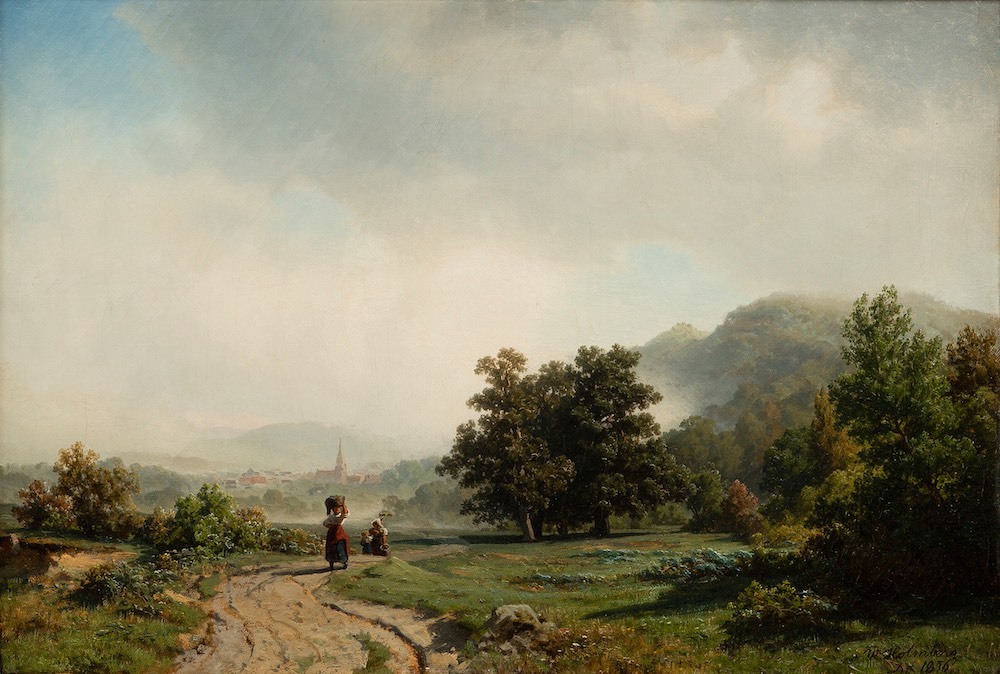Werner Holmberg - Landscape in Germany

WERNER HOLMBERG, LANDSCAPE IN GERMANY.
Sign. Düsseldorf 1856. Oil on canvas 54x79 cm.
Werner Holmberg was the first Finnish artist to gain international prestige. Despite his early death from pulmonary tuberculosis, he managed to develop a new intensity in landscape painting, achieving a vibrant natural expression that departs from the static quality of the Biedermeier period. Based on an in-depth study of the art of Werner Holmberg, professor Aimo Reitala (1986) regards this artist as a classic master of Finnish landscape painting.
The artistic training available in Finland was quite rudimentary in Holmberg’s day, so he was forced to travel abroad. Electing to study in Düsseldorf and the nearby village of Grafenberg in summer 1853, he began by working diligently alone on sketches of natural subjects. The works of Andreas Achenbach and Johan Wilhelm Schirmer also provided some pointers for artistic solutions. The Norwegian Hans Gude was then selected to serve as his private teacher for a couple of years beginning in 1855. This was an opportune solution. Where instruction at the Academy of Fine Arts could otherwise have led him along familiar and ossified pathways, the close proximity of private studio work inspired the gifted and motivated Werner Holmberg as he almost became a member of the Gude family. The Norwegian connection was further reinforced at a later stage when Werner Holmberg married art student Anna Glad.
Completed in 1856, Landscape in Germany with village in the background dates from Werner Holmberg’s first breakthrough year in Düsseldorf. Together with his fellow painters, he was particularly appreciative of the Autumn morning painting completed in the same year, which was acquired for the collection of the Turku Art Museum in 1991. In common with the work now offered for sale, this painting superbly encounters a moment of nature with mist rising from the valley and a lightly clouded sky, but Landscape in Germany with village in the background is more multi-faceted and colourful, thereby preferring to interpret the mood of the day or early evening and summer than the dampness of an autumn morning.
Where the animating elements of the Autumn morning painting are the hunter and his dog, the dimensions of the landscape in Landscape in Germany with village in the background are expressed by two women and a girl returning from the field or meadow. One of the women carries a basket on her head, while the other is holding a hay rake over her shoulder and carries a basket in her hand with the girl beside her. The colour doctrine of the Düsseldorf school is manifest in the enhanced colour intensity of rusty red tree highlights painted among the verdant leaves. A winding road is successfully adapted to a flat landscape with the church tower and buildings of the village visible on the hazy horizon in the background and counterbalancing high mountain slopes covered in vegetation on the right. The overall effect displays an interesting asymmetry creating a sense of space and lushness in the landscape.
The winter season of 1856 was also a lucrative one for Werner Holmberg, who wrote to his father that he had earned as much as 1500 thalers and sold nearly all of the works that he had painted. These works must also have included this spacious German landscape. Besides financial success, the artist’s general confidence was boosted in particular by the appreciative recognition shown by his colleagues for his art.
Leena Ahtola-Moorhouse
MORE INFORMATION
Werner Holmberg (1830–1860)
Landscape in Germany with village in the background, 1856
Oil on canvas, 54 x 79 cm
Signed at lower right W. Holmberg. / Dsf. 1856.
Provenance Florence Quensel (née Dickson); Arnold Helling since 1945; current owner.
CONTACT OUR SPECIALIST

























